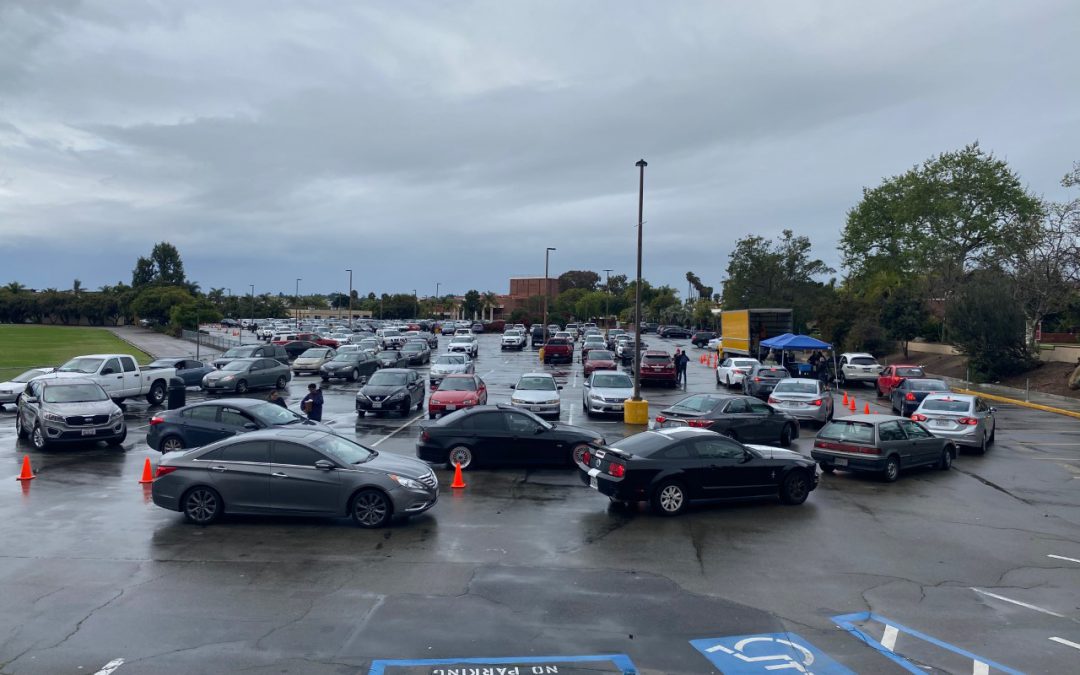From emergency grants to free computers, the Foundation has helped hundreds of Palomar’s most vulnerable students transition to remote learning in the wake of California’s social distancing measures.
SAN MARCOS — Amid the rapid and dramatic changes brought on by the COVID-19 pandemic, the Palomar College Foundation has led an unprecedented effort to help students stay equipped and on track.
And the feedback is already pouring back in from the students:
“You have no idea what this will do for me and my family.”
“This changes everything.”
“I just received your voicemail and I am unbelievably appreciative. This means more to me and my family than you know.”
Palomar declared the week before spring break a “non-instructional week” to allow faculty and staff to prepare for the transition to remote learning. Meanwhile, thousands of students who had never taken an online class logged in for the first time this week—a new learning environment requiring technology that many didn’t have at home.
And this, campus leaders said, on top of the already harrowing prospects of COVID-19 contagion and social distancing.
“Many of our students would be challenged to continue their education if it wasn’t for the Palomar College Foundation and the fine work they’re doing,” said Superintendent/President Jack Kahn. “The way the Foundation has cared for our students has made this whirlwind transition to distance learning much more feasible—especially for those needing it most.”
“It’s been inspiring to be part of fulfilling our mission to remove barriers to education, mobilizing quickly to make sure our students can stay in school while we transition to remote learning,” said the Foundation’s Executive Director, Stacy Rungaitis.
She said that the question from the beginning of the crisis in early March has been, “What do our students need? They need technology, and many of them need funding to be able to continue their education.”
Emergency Student Grants
To date, the Foundation has given more than 160 emergency student grants totaling $25,000, to help students buy groceries and pay for internet access, among various other needs.
“Most of the requests are just heart-breaking,” said Rungaitis. “We’ve got situations where students have lost their jobs, because so many of our students work part-time in industries that are being challenged right now. They’re coming to us food-insecure, housing-insecure. Some of them need internet connections, so we have been able to provide them a little funding so they can get a hot spot going. There are so many needs to be considered in an unprecedented time like this.”
For example, Rungaitis cited a recent grant to help three students receiving aid from Palomar’s Disability Resource Center. One of the grants covered the purchase of a large-print keyboard for a visually-impaired student—“a $20 item that is going to keep this student in school,” said Rungaitis.
Free Computers for Students
On March 13, as it became clear the college was going to need to comply with widespread social distancing measures, Rungaitis called a San Diego nonprofit called Computers2Kids. The organization confirmed that it had computers available, and as of April 3, the Foundation has distributed nearly 500 computers to Palomar College students.
“My first thought was, how are our students going to do this, if we go to remote learning? I think about the library and all of the students who use those computers—this is going to be so challenging for our students who don’t have access to the number one thing you need in a remote learning environment,” Rungaitis said. “I knew we had to do something. This is what the Foundation board, staff and donors do—we remove barriers to education.”
To fund the computer distribution, Darlene Shiley made a leadership gift that became the first donation in a new fund-raising campaign, the Darlene Shiley Emergency Fund, to put computers into students’ hands. Many have followed Ms. Shiley’s challenge to donate.
“Right now, we’re keeping up with the demand, but we’re still working to source additional computers,” said Rungaitis.
Nursing Program Grant
All of Palomar’s academic programs have felt the impact of COVID-19, with many classes being taught remotely for the first time, but among the hardest-hit was the college’s widely respected Nursing Education Department.
The students in the Registered Nursing program were hit doubly hard, with labs that can only be performed in person postponed, and clinical rotations that are held in local hospitals suspended for safety reasons.
“We need our nurses more than ever,” said Rungaitis. “Unfortunately, this particular group of students are under extra stress. Of 147 nursing students, 36 of them were two months away from graduating, and they can’t do that without their clinical rotations.”
Rungaitis said the Foundation provided a $30,000 grant to fund a virtual platform that allows students to simulate their clinical rotations without leaving their homes. The Foundation will also support the enrollment fees for three remote classes that nursing students will be able to take starting Monday, April 6.
“More than anything, this is an opportunity for them to keep their skills up, and keep them engaged in the learning process,” she said. “It’s an unnerving time for nurses, and this is just the right thing to do.”
Faculty Innovation Grants
During several intense weeks of rapid-fire changes on campus, the Foundation has also ramped up its faculty innovation grants.
“The Foundation board will this month be looking at some of the super-cool, innovative things our faculty are doing as we move into remote learning,” said Rungaitis. “This year, more than ever, we’re looking at directing funds to support our faculty as we’re all learning and doing new things.”
Overall, Rungaitis said, the month of March was one of the busiest in the Foundation’s history, with no sign of letting up soon: “We understand this has been an exceptionally unnerving situation on all levels, so we want to bring hope and inspiration to everyone connected to Palomar College.”

